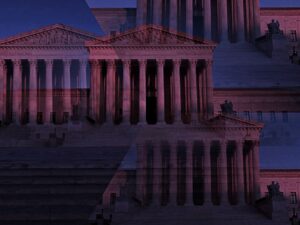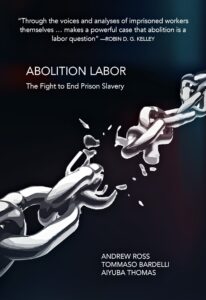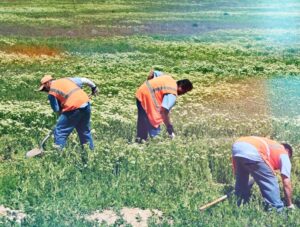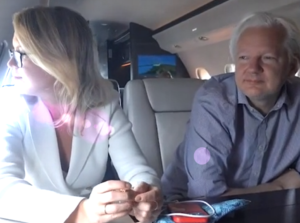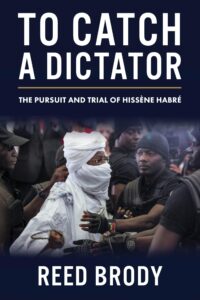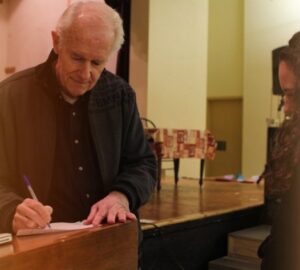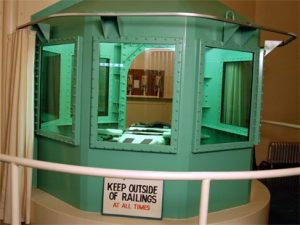Welcome to Law and Disorder Radio
Law and Disorder is a weekly independent civil liberties radio program airing on more than 150 stations and on Apple podcast. Law and Disorder provides timely legal perspectives on issues concerning civil liberties, privacy, right to dissent and practices of torture exercised by the US government and private corporations.
Law and Disorder July 8, 2024
Podcast: Play in new window | Download
Two Very Important Supreme Court Decisions
When does the government cross the line from using its highly visible bully pulpit to advocate for policies and principles it has every right to promote into the prohibited zone of threatening to use its awesome powers to punish viewpoints it opposes by coercing others to refrain from doing business with the speaker.
In two very important recent decisions, the U.S. Supreme Court was asked to decide whether it is still the law of the land that a government entity’s “threat of invoking legal sanctions and other means of coercion” against a third party “to achieve the suppression” of disfavored speech violates the First Amendment.
In National Rifle Association v. Vullo, in a rare unanimous opinion written by Justice Sonia Sotomayor, the Court held that “Government officials cannot attempt to coerce private parties in order to punish or suppress views that the government disfavors.”
But the decision in the related case of Murthy v. Missouri, was not unanimous. In that case a federal district judge had ruled that the U.S. Surgeon General (Vivek Murthy) and other government officials violated the First Amendment by seeking to convince social media platforms to remove content the government deemed disinformation about COVID, the 2020 election and other subjects.
But on June 26, the Court punted. A 6 member majority – made up of both conservatives and liberals – held that the plaintiffs did not have standing. In dissent, three conservative justices said they would have found standing and on the merits they would have found a First Amendment violation.
Guest – Attorney David Cole argued the NRA case in the Supreme Court. He’s been the National Legal Director of the American Civil Liberties Union (ACLU) since 2016. He previously served as a staff attorney for the Center for Constitutional Rights. He has litigated a wide array of major civil liberties controversies and has personally argued 8 cases before the US Supreme Court and served as counsel in more than 30.
—-
Abolition Labor: The Fight To End Prison Slavery
Operating in the secrecy of the nation’s more than 1,800 prisons, a kind of shadow slave culture is being fostered. Few Americans are aware of the exploitative and pervasive practice of forced prison labor. The 13th amendment to the US Constitution abolished slavery, but it made one exception: prison labor.
Prisoners are forced to work with minimal or non-existent wages, and often with no labor protections. Understanding the scope and implications of forced prison labor is crucial for anyone concerned with social justice and equity. It calls for a re-examination of our treatment of incarcerated persons and for alternatives that promote fairness for everyone, regardless of their legal status. By shining a light on this issue, we can advocate for reforms that prioritize rehabilitation over punishment and strive towards a more just and humane criminal justice system. A new book, Abolition Labor: The Fight To End Prison Slavery, provides an eye-opening overview of the extent of this problem.
Guest – Andrew Ross is a renowned social activist, author, and Professor of Social and Cultural Analysis at New York University, where he also directs the Prison Research Lab. Andrew has contributed to prominent publications like The Guardian, The New York Times, and The Nation. He has authored or edited over twenty-five books, with the recent work, Abolition Labor, co-authored with Aiyuba Thomas and Tommaso Bardelli.
Guest – Aiyuba Thomas recently earned his M.A. from NYU’s Gallatin School of Individualized Study and is an affiliate of the NYU Prison Research Lab. He currently serves as project manager for the Movements Against Mass Incarceration’s archival oral history project at Columbia University. There, he documents the experiences and challenges faced by those affected by the criminal justice system. His firsthand perspective and his extensive knowledge on the subject makes him a powerful voice in the conversation of abolishing forced prison labor.
Law and Disorder July 1, 2024
Podcast: Play in new window | Download
Freedom For Julian Assange!
After serving 1901 days in solitary confinement in a tiny cell in the infamous Belmarsh prison in London, journalist and publisher Julian Assange is free at last.
Julian gained his freedom pursuit to a plea bargain with the government of the United States which had sought to extradite him and try him under the 1917 Espionage Act. He faced a certain conviction in a hostile Virginia court and 175 years in prison on 17 counts of conspiracy to commit espionage for receiving and publishing information damaging to the United States government.
Julian Assange was forced to plead guilty to one count of espionage in return for the time he has served in prison. Prior to that he was confined for seven years in the Ecuadorian Embassy in London, where he had sought and received political asylum.
The alleged crime he was accused of committing was the receipt and publication in 2010 of the so-called Iraq and Afghanistan war logs which document American government guilt in torture and murder including the 11 civilians and two Reuters journalists.
Julian Assange was sentenced to time served by an American federal court judge on an island in the Pacific Ocean 2000 miles from Australia. Julian Assange will now be living as a free man in Australia with his wife and two children.
Until Julian Assange Is Pardoned Press Freedom Remains At Risk – article by co-host attorney Stephen Rohde
Guest – Randy Credico, a steadfast supporter of Julian Assange. Mr. Credico. hosted the program “ Countdown to Freedom” in support of Julian for many years. He had visited him in Belmarsh prison.
—-
War Crimes, Dictators and the ICC
The International Criminal Court (ICC) along with the International Court of Justice (ICJ) were set up in 1998 in order to help prevent wars and crimes against humanity with the profound understanding that without a system of international law. a future World War III might eliminate humanity.
The United States of America, under Bill Clinton, was one of seven countries that voted against the Rome statute which set up the International Criminal Court. Clinton did eventually sign the statute but George Bush “unsigned“ it and the United States has had a testy relationship with the court. Indeed under Trump, the US imposed sanctions on the court and its prosecutor.
Last month Imran Khan, the chief prosecutor of the International Criminal Court, issued arrest warrants for Israel Prime Minister Benjamin Netanyahu and Yoav Galant, the Israeli Minister of Defense for war crimes and crimes against humanity. The ICC also issued arrest warrants for three top leaders of Hamas.
Guest – Attorney Reed Brody, was a friend, colleague, and mentee of our late cohost Michael Ratner. Reed Brody is the author of the recently published book To Catch a Dictator: The Pursuit and Trial of Hissene Habre. He has worked for many years with Human Rights Watch. Reed Brody has helped pursue the dictators Augusto Pinochet of Chile and Jean-Claude “ Baby Doc” Duvalier of Haiti. He has uncovered atrocities by US backed Contras in Nicaragua, led United Nations missions in El Salvador and the Congo, and exposed Bush administration torture.
—————————————-
Law and Disorder June 24, 2024
Podcast: Play in new window | Download
A Brief History of Kill Lists, From Langley to Lavender
Two artificial intelligence systems are being used by Israel and the United States to compile kill lists of Palestinians in Gaza. They are called Lavender and Where’s Daddy. This has led to the indiscriminate slaughter of whole families and has killed mostly women and children. The CIA and the US military have always tried to use the latest data processing technology to identify and kill their enemies. The history of American government assassinations goes back to collaborating with ex-Nazi intelligent officers after World War II.
Guest – Medea Benjamin, is co-founder of the international antiwar organization CODEPINK. She is the author of several books, including, with Nicholas J.S. Davies, War in Ukraine: Making Sense of a Senseless Conflict. She has been an advocate for social justice for more than 40 years. Described as “one of America’s most committed — and most effective — fighters for human rights” by New York Newsday, and “one of the high profile leaders of the peace movement” by the Los Angeles Times, she was one of 1,000 exemplary women from 140 countries nominated to receive the Nobel Peace Prize on behalf of the millions of women who do the essential work of peace worldwide.
—-
A Trend In Abolishing Capital Punishment
A growing number of states have abolished capital punishment in recent years. However, the death penalty remains on the books in 27 states, although the number of executions in American is at an all-time low. It is well documented that the death penalty is riddled with fatal flaws. Literally, the flaws are denying defendants a fair trial and are killing innocent people. An average of 4 wrongly convicted death-row prisoners have been exonerated each year since 1973.
According to recent research, jurors are three times more likely to recommend a death sentence for a black defendant than for a white defendant in a similar case. The death penalty does not serve as a deterrent. A study by the Death Penalty Information Center found that the South has consistently had by far the highest murder rate, yet the South accounts for more than 80% of all executions. The Northeast, which has fewer than 0.5% of all executions, has consistently had the lowest murder rate.
Guest – Mike Farrell is the President of Death Penalty Focus, an organization on whose Board I’ve served for many years. Known to millions as “B.J. Hunnicutt” on television’s historic show “M*A*S*H,” he is also a writer, director and producer. A human rights activist for over 35 years, Mike has taken part in scores of aid missions and human rights delegations to countries all over the world. Mike has visited prisons and been personally involved in numerous death penalty cases across the U.S. for over three decades.
—————————-
